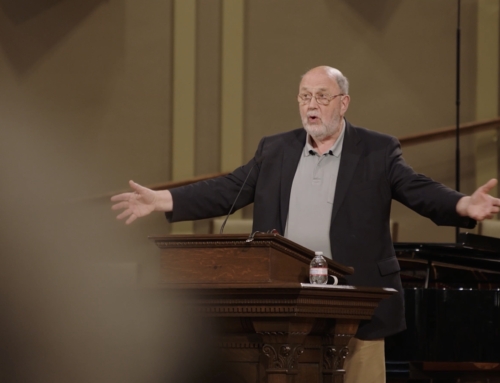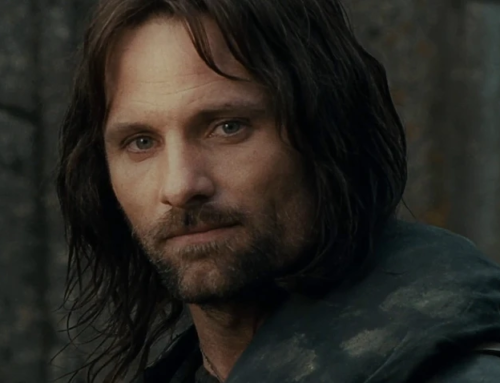There I was, 40 stories above the bustling traffic below. Skyscrapers surrounded me. The sun shone brilliantly. The street was a long, long way down. But there I was. The challenge was before me. I was on a roof far above the city street on a wooden plank, about 10 inches wide, that extended about six feet beyond the edge of the building. I was urged to just move three or four feet onto the plank which hovered over certain disaster.
There was no wind, just noise from the cars and trucks below. My friend who was next to me on the roof urged me to walk out onto the plank. So I inched myself out onto the wooden board, not entirely confident it could hold me. But it did hold me. Terror abounded, so after venturing only two feet, I gingerly backed off the plank to the safety of the rooftop. Rather than plunge to certain death, I came back to the edge and onto ‘solid footing’ and peace.
Totally embarrassed that I could not go further out onto the plank, I spoke to my friend. I couldn’t believe that my mind could not get me to trust what was true. I was humbled that my will would not allow me to proceed further.
I then took off my Vive Virtual Reality headset to reveal the truth. I was standing on a concrete floor on the first floor of a building. I was in a beautifully appointed, updated warehouse studio where the team from The Bible Project worked to develop cutting edge communication tools for people to understand the Bible better.
My mind was overwhelmed with ‘false’ signals about where I was and about ‘how my world looked’. It is called ‘virtual reality’ because the experience is not ‘real’ but it sure feels ‘virtually’ real.
Is Christianity ‘Virtual Reality’?
Many people approach Christianity as if it is a set of abstract beliefs to which people subscribe and around which people organize their lives. That may be helpful to some people, but it is merely ‘virtual’ reality.
Many people approach Christianity as if it is a set of abstract beliefs to which people subscribe and around which people organized their lives. That may be helpful to some people, but it is merely ‘virtual’ reality. Click To TweetThe reality of the Christian life is found in the risen Christ, who is King. Nothing else is sufficient. True reality for the Christian revolves around a life of devotion to the Risen King, lived out by the presence and power of the Holy Spirit. Theological categories are no substitute for the presence of Christ by His Spirit. We must not settle for substitute ‘realities’ created by well-meaning pastors and theologians.
The Letter of Paul to the Colossians puts great focus on this reality in the beautiful poem found in Colossians 1:15-20 (KNT):
15 He is the image of God, the invisible one,
the firstborn of all creation.
16 For in him all things were created,
in the heavens and here on the earth.
Things we can see and things we cannot,
—thrones and lordships and rulers and powers—
All were created both through him and for him.
17 And he is ahead, prior to all else
and in him all things hold together;
18 And he himself is supreme, the head
over the body, the church.
He is the start of it all,
firstborn from realms of the dead;
so in all things he might be the chief.
19 For in him all the Fullness was glad to dwell
20 and through him to reconcile all to himself,
making peace through the blood of his cross,
through him—yes, things on the earth,
and also the things in the heavens.
While we are created in God’s image, Christ is the image of God. Seeing Christ is seeing God. Prof. Wright explains in the course, Paul and His Letter to the Colossians, that this section in Col 1:15-20 reflects Proverbs 8 (especially 8:22) along with other Jewish writings regarding Wisdom, the ‘grand lady’ who is present from the beginning of all things and who is with God, accomplishing all that is good in the created realm. It is as if Wisdom is God’s own ‘second self’, helping to complete the work at the beginning of all things.
Christ at the Beginning
In Prov 8:22 we find reference to ‘at the beginning’. In Hebrew, this is one word, bereshyt. In the Greek version of the Old Testament, the Septuagint, this word is arche, again, one word rather than many. Of course, the very first word of the Bible in Genesis 1:1 is ‘bereshyt’. As Prof. Wright explains:
(Regarding bereshyt)…. ‘be’ means ‘in’ or ‘through’ or ‘for’. ‘reshyt’ means ‘beginning’ or ‘head’ or ‘firstfruits’ or ‘sum-total’. What do we find in Ch. 1:15-20? We find all four meanings of ‘reshyt’ and all three meanings of ‘be’ explored poetically as though Paul is saying, ‘Take everything that Proverbs Eight is about and everything that Genesis One is about. Put them together in the melting pot and stir them with Jesus in mind. And this is what comes out.
We have Jesus as the beginning, as the head, as the sum total, Jesus as the firstfruits. And we have all things created and all things reconciled in Him and through Him and for Him. Paul is saying that actually, the very first word of the Bible contains all this rich treasure. We only see it now in retrospect, but it was there from the beginning.
Jesus and Wisdom
Most readers of Paul’s letter to the Colossians will miss this ‘reality’ because they have the wrong ‘virtual reality’ of a limited background while Paul is painting a picture that can be appreciated only when the true reality of who Jesus is becomes unpacked in this glorious poem.
Most readers of Paul’s letter to the Colossians will miss this ‘reality’ because they have the wrong ‘virtual reality’ of a limited background. Click To TweetAll of a sudden, when ‘seeing’ this text again for the first time, explained through the correct lens of Jewish perspective, a new awe comes to us. Jesus and Wisdom are seen in proper light and we now see that the way and words of Jesus becomes the only way of living in the reality of Jesus’ presence through the indwelling presence of God’s Spirit. Thus, other ‘secondary issues’ that so preoccupy Christians fade into the background when the fullness of God, Jesus, is in the foreground.
How easy it is for us to miss putting Jesus at the center of all things and to measure the prevailing ‘wisdom’ of the world and the so-called ‘wisdom’ of many Christians against the very Wisdom of God, Christ Himself.
The beauty of understanding Colossians 1:15-20 is that it provides the antidote for many ways of thinking that are contrary to God’s wisdom. We can choose ‘reality’ rather than the ‘virtual reality’ created by our surrounding culture.
David P. Seemuth, PhD
Latest posts by David P. Seemuth, PhD (see all)
- Advent Reflections from the N.T. Wright Online Team - December 5, 2022
- YouTube as Public Reading of Scripture - August 29, 2022
- What I Learned From A Week With Professor Wright - June 16, 2022







